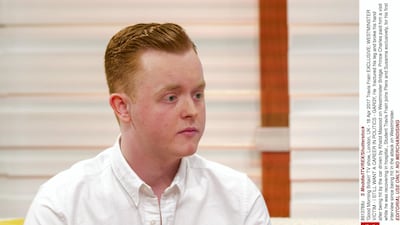A teenager mown down by a terrorist’s car during the worst attack on British soil for 12 years received death threats from extremists while he lay in hospital with multiple injuries, the National has learned.
Travis Frain, 19, received abusive messages via social media from Islamist and far-right wing extremists who suggested he was making up his unwanted role in the attack by a British-born terrorist who killed five and injured 50 in London in March last year.
Mr Frain detailed the threats as he revealed how he felt neglected by British authorities in the months after the attacks and called for reforms to a system ill-equipped to cope with the needs of survivors of terrorism.
He said he was forced to wait for ten weeks for an appointment with Britain’s state-run health service to address the traumatic mental effects of the attack despite pleas for swifter treatment from specialist advisers and his doctor. When he finally got an appointment, he was told by a specialist to drink a warm glass of milk to help him sleep better.
“I know it sounds like a joke - but you couldn’t make it up,” he said.
A spokesperson for Lancashire Care NHS Foundation Trust said it was "really sorry to hear that Mr Frain has not had a positive experience of our services".
It added: "The matters have been investigated by us and the results fed back to Mr Frain through his MP. We would like to reassure you that our number one priority is always to ensure that our patients receive the highest quality of care at the right place, every time."
Mr Frain has written to the prime minister, Theresa May, to detail his concerns. He has also become a trustee of a charity, the Tim Parry Johnathan Ball Foundation for Peace, which runs a network that specialises in the care of victims of terrorism. The Survivors' Assistance Network provided “the only reliable and constant source of assistance," he said, adding: “We didn’t get anything from the government.”
_____________
Read more:
More than 600 people have sought help following UK terror attacks
Manchester terrorist attack might have been averted: report
ISIL planners targeted Britons on social media for London Bridge attack
_____________
Mr Frain, a history and politics student, was walking across London’s Westminster Bridge on March 22 last year when he was hit head-on by a car driven by Khalid Masood, a radicalised Briton, who had taken anabolic steroids before the attack, an inquest hearing heard on Monday.
Mr Frain was thrown on to the bonnet of the car as it was driven along the pavement outside the UK’s parliament building, before being tossed aside and left with injuries including a broken leg, broken hand, torn ligament, whiplash and cuts.
Masood killed four pedestrians during the attack and then stabbed a policeman to death who was guarding parliament before he was shot dead by police. The attack was the first of five that rocked Britain in 2017 leaving a total of 36 people dead.
Mr Frain received the first threat via Facebook a day after the attack, he told The National, from an apparent conspiracy theorist who accused him of treason and made a threat against his life. Police officers visiting Mr Frain encouraged him to report the abuse.
The London force passed the case to colleagues in Manchester but the ‘malicious communication’ case has not been actively pursued for three months.
“Officers investigated, however no arrests were made,” said the Manchester force in a statement. “In October 2017 the crime was filed, however should further information come to light we will continue to investigate.”
Mr Frain said he was not told that officers in Manchester were investigating the case, or that it had been effectively closed.
“I don’t want to say abandoned because it’s a strong word, but it’s along those lines,” said the 19-year-old student of his experiences after the attack. “That’s how one of my friends summed it up, one of the other lads involved. He said it almost like when you’ve left London, it’s all over.
“Governments and all sorts of services prepare for years for these sorts of things. When it came around, it didn’t feel like there was any clear direction.”
Mr Frain was not alone in receiving abuse from abusive trolls with some accusing victims of trying to cash in on what had happened by talking to the media after attacks in London and Manchester, according to the UK health authorities.
NHS England said that “innocent people have unwittingly been the target of trolls who use social media to prey on victims, subjecting them to vile and upsetting abuse”.
His experiences followed similar complaints from victims of an attack on Berlin’s Christmas markets in December 2016, which left 12 people dead.
Families complained they had nobody to speak to after the attacks and faced a series of bureaucratic hurdles to secure compensation. A government-appointed ombudsman called for improvements to the system.


